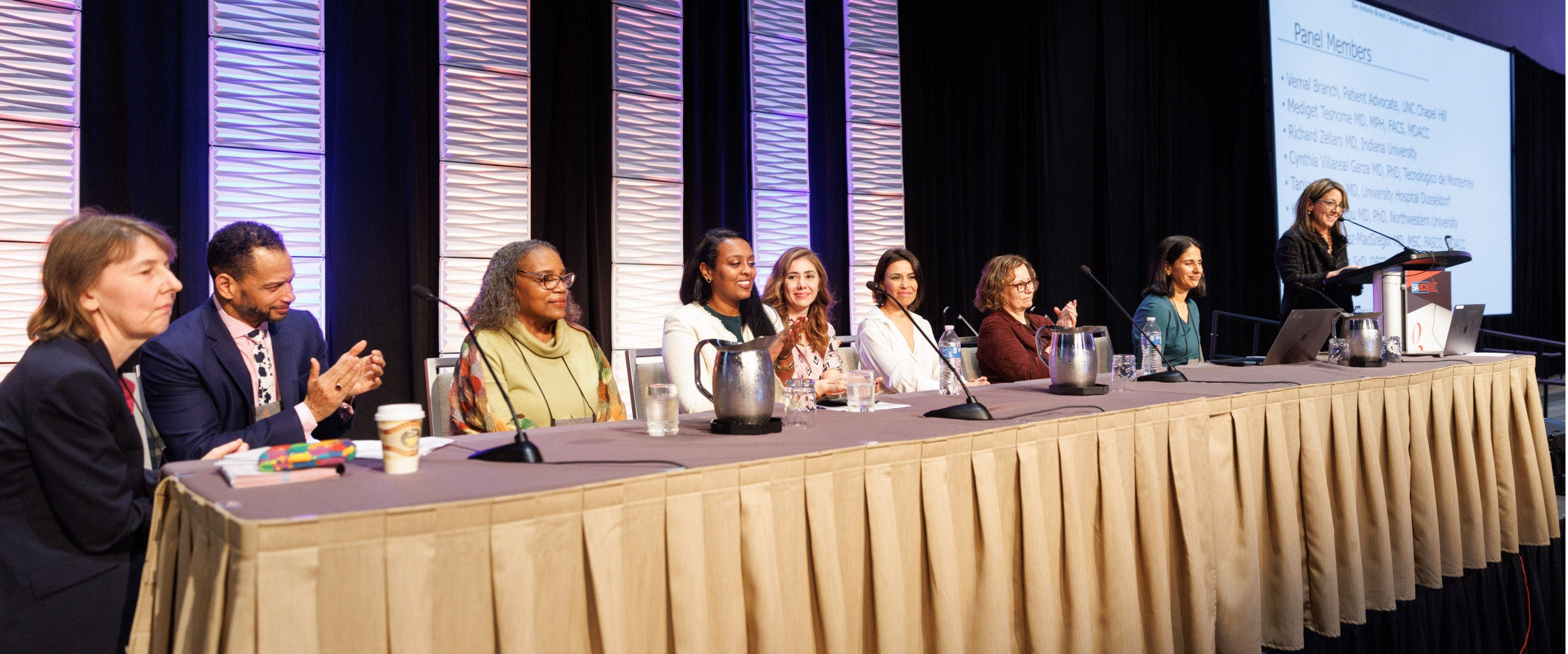The San Antonio Breast Cancer Symposium (SABCS) is the annual breast cancer conference that brings together researchers, clinicians, patients and manufacturers from all over the world to discuss the latest breast cancer research. Last December, we were pleased to be able to attend in-person, and we'd like to share with you the highlights from SABCS.
- No benefit found for neoadjuvant olaparib (Lynparza) plus paclitaxel versus carboplatin plus paclitaxel for patients with HER2-negative breast cancer with homologous recombination deficiency (HRD).
Data presented from the GeparOLA study showed that at a median follow-up of 49.8 months, the rate of invasive disease-free survival (iDFS) among patients who received olaparib plus paclitaxel was 76%, compared to the 88.5% rate among patients who received carboplatin vs. paclitaxel. Additionally, the 4-year locoregional recurrence rates were higher for those who received olaparib and paclitaxel (10.3%) versus those who received carboplatin and paclitaxel (4.9%).
Read more
- Individuals with invasive breast cancer with low POLAR scores may be able to skip radiation therapy following a lumpectomy.
A POLAR score is a score derived from a 16-gene molecular signature that investigates the differences in gene-expression between patients with or without local recurrence after lumpectomy. In this study, a meta-analysis of 623 patients with lymph node-negative, ER-positive, HER2-negative breast cancer was conducted to evaluate the predictive value of POLAR scores on recurrence rates with or without radiation therapy. Results showed that among patients with low POLAR scores who received adjuvant radiation therapy and those who didn’t, there was no significant difference in local recurrence rates.
Read more
- DESTINy-Breast03 Trial shows promising results for HER2-positive mBC patients.
Among patients with HER2-positive metastatic breast cancer, results from the DESTINY-Breast03 trial showed statistically significant overall survival (OS) and progression-free survival (PFS) benefits for patients receiving trastuzumab deruxtecan (Enhertu), compared to patients receiving trastuzumab emtansine (Kadcyla). At 24-month follow-up, OS was 77.4% for patients getting trastuzumab deruxtecan and 69.9% for those getting trastuzumab emtansine. The median progression-free survival for patients receiving trastuzumab deruxtecan was 28.8 months compared with 6.8 months for patients receiving trastuzumab emtansine. Additionally, in the trastuzumab deruxtecan group, risk of death was reduced by 36%.
Read more
- Low dose tamoxifen continues to lead to reduced risk of recurrence among women with intraepithelial neoplasia.
Ten-year follow-up results from the TAM-01 study, which explored use of a 5-mg daily dose of tamoxifen (babytam), were shared at SABCS. Women in the study were 75 years or younger and had either atypical ductal hyperplasia, lobular carcinoma in situ, or ductal carcinoma in situ and randomized either receive babytam or a placebo. Results showed a 42% reduction in incidence of invasive breast cancer or DCIS. Ipsilateral breast events were reduced by 32% while contralateral breast events were reduced by 64%.
Read more
- POSITIVE results might offer hope to young women being treated with endocrine therapy who want to get pregnant.
Patients in the POSITIVE trial showed similar rates of short-term recurrence among those who paused endocrine therapy and those who did not. The 3-year recurrence rate of those who paused treatment was 8.9% and among those who continued treatment, it was 9.2%. At least 1 pregnancy was achieved in 74% of the 497 women who tried to get pregnant, with 63.8% getting pregnant where 8% of babies were low birth weight and 2% had birth defects. These numbers are similar to the numbers within the general population.
Read more
- Chemotherapy, including those that are taxane-based, does not lead to increased risk of breast cancer-related lymphedema.
Taxane-based chemotherapies have been found to lead to fluid retention in the extremeities which can lead to an increased risk of breast-cancer related lymphedema. To explore this further, patients who received chemotherapy, including taxane-based chemotherapies, were compared to patients who did not receive chemotherapy. No difference was found between these group in terms of risk of developing breast-cancer related lymphedema. Instead, age, having a body mass index (BMI) equal to or greater than 30, and axillary lymph node dissection were shown to led to a significantly increased risk of breast-cancer related lymphedema.
Read more
- HER2CLIMB trial results were confirmed using real-world data from HER2-positive metastatic breast cancer patients.
Real-world analysis confirmed the safety profile for the combination of tucatinib (Tukysa), trastuzumab (Herceptin), and capecitabine. The highest reported adverse effects of any grade from the real-world analysis were fatigue (70%), palmar–plantar erythrodysesthesia syndrome (61%), nausea (61%), and anemia (61%). 26% of patients achieved a partial response; in 44% of patients with brain metastases, partial responses were observed.
Read more
- 12-year follow-up data on long-term recurrence and overall survival show that a portion of early-breast cancer patients may safely skip chemotherapy.
12 years of follow-up data from the TAILORx trial continued to show that for a large proportion of patients with early-stage breast cancer, chemotherapy may have no benefit. Those who may be able to safely skip chemotherapy are patients who were postmenopausal or older than 50 years at diagnosis with ER-positive, HER2-negative and lymph node-negative breast cancer with a 21-gene recurrence score of 0 to 25. These patients may be able to be treated with endocrine therapy alone. Results from this mean that oncologist can continue to use results from the 21-gene recurrence score to guide decisions about whether to treat patients with chemotherapy.
Read more
More highlights of the research presented at the 2022 San Antonio Breast Cancer Symposium can be found on the following websites:







